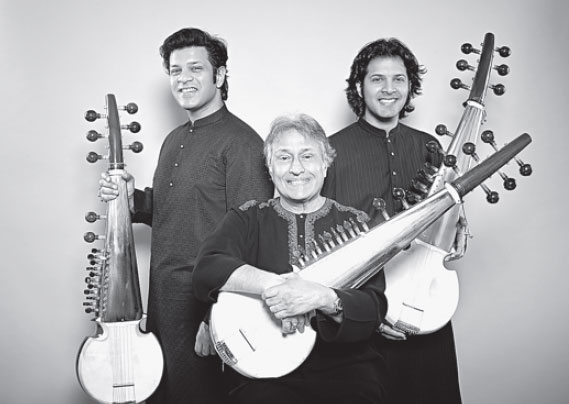India's musical siblings to make China debut with rare instrument
When musicians Amaan Ali Khan and Ayaan Ali Khan perform in Shanghai at the weekend and in Beijing later in the month, audiences will get a taste of Indian classical music through a rare instrument called the sarod.
Sons of the award-winning sarod maestro Amjad Ali Khan, Amaan, 38, and Ayaan, 36, are seventh-generation players of the instrument, the name of which is said to have been derived from a Persian word associated with music.
In an interview with China Daily ahead of the brothers' China debut on Saturday, they talk about the lute-like stringed instrument that has a steel fingerboard and a belly usually covered with goatskin.
|
Indian sarod players Amaan Ali (left) and Ayaan Ali (right) with their father, Amjad Ali Khan. Provided to China Daily |
The sarod has 19 metal strings of which 11 are sympathetic. The body is made of teakwood and the strings are pressed with the edges of nails while playing, not the fingertips.
Some say the sarod's origin goes back to an instrument called the rabhab of Afghanistan. With its evolution around the middle of the 19th century, the sarod became more expressive and is an important part of Hindustani music, a prominent school of Indian classical music.
The brothers, who live in New Delhi, say Indian classical music has had a spiritual and scientific development through long years. The most important element of Indian classical music is the raga, which comprises a set of ascending and descending notes within a certain discipline.
An interesting aspect of Indian classical music is the coming together of different performers onstage like a "rehearsed orchestra" although in reality one musician may not know what the other is going to do ahead of a concert.
"Since we are siblings, we read one another's minds onstage. So, there are no rehearsals for our shows," the older brother Amaan Ali Khan says.
The brothers take pride in the fact that their 70-year-old father inspires and encourages them to take the sound of the instrument to new levels.
Many decades ago, classical music performances were limited to the aristocracy in many parts of the world but in more recent times they have become accessible to the masses.
Amjad Ali Khan, who was born in a family of well-known musicians, has been performing globally since the 1960s.
As young boys, the brothers learned to play the sarod from their father and often sat close to him during his shows to observe his style as well as understand the audience.
Calling their father "abba", the brothers say one of the most important things they learned from him was that for classical musicians "music isn't just a profession but a way of life".
"From the time we were born, the language spoken was that of music ... Though our father is a strict traditionalist, he has always believed in adapting to change. Indian classical music has no rules about how it should be presented. That's very individualistic," says Amaan Ali Khan.
Growing up while listening to different genres of music, the brothers, like their father, have tried to take the sarod to new audiences.
With their roles as performers, composers and conductors, they have had many collaborations with foreign musicians, such as performing with US folk songwriter Carrie Newcomer and Grammy nominated Oud player Rahim Alhaj to make the ancient instrument fit into the contemporary scene.
The brothers' joint album, Moksha, was nominated at the Grammys for best traditional world music album in 2005.
Amaan Ali Khan also says their mother, Subhalakshmi Khan, an artist herself, who learned bharatanatyam (an Indian classical dance) from the late exponent Rukmini Devi Arundale, sacrificed her career for the family.
"Today what we are, who we are is all owing to her contribution," says Amaan Ali Khan.
Ayaan Ali Khan himself is also a father with twin boys, Zohaan and Abeer.
"They seem quite passionate about music but there's no pressure. They are three and a half but their grandfather has already started lessons," he says.

























